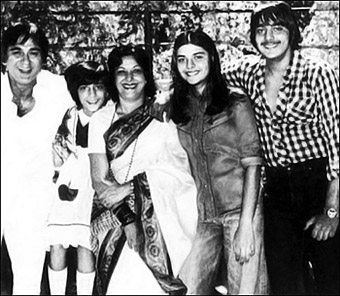 History of the Mohyals reveals that they are the branch of the bigger Bawanjai Saraswat group. They claim to be the descendants of 6 `raj` rishis: Bharadwaj (Datt and Vaid), Bhargava (Chhibbar), Parashara (Bali), Kashyappa (Mohan), Vasishtha (Lau) and Koshal (Bhimwal). They have a prominent place in the annals of India and have also figured in the affairs of Arabia, Central Asia, Afghanistan, Persia and China.
History of the Mohyals reveals that they are the branch of the bigger Bawanjai Saraswat group. They claim to be the descendants of 6 `raj` rishis: Bharadwaj (Datt and Vaid), Bhargava (Chhibbar), Parashara (Bali), Kashyappa (Mohan), Vasishtha (Lau) and Koshal (Bhimwal). They have a prominent place in the annals of India and have also figured in the affairs of Arabia, Central Asia, Afghanistan, Persia and China.
In Arabia fraternal bonds evolved between the Datt chief, Sultan Rahab and the descendants of the prophet Mohammed, Hassan and Hussain, whose allies they became in the war of Karbala and whose defeat they later avenged. Consequently, the Sayyids, the descendants of the Prophet, continued to show great reverence for the Mohyals as dauntless defenders of humanity.
On their way home from Arabia, they established a Brahmin dynasty in Kabul where they reigned from about 860 to 950 AD and even today the Mohyals residing in Kabul are called diwans or ministers. The Chhibbars claim to have ruled Bhera, known as Chhibbamn-di-Rajdhani or the capital of the Chhibbars.
Before the partition of India most Mohyals were settled in the Jhelum District. With partition, the vast majority was rendered homeless. They came and settled down in Punjab and Haryana, especially in the districts of Gurdaspur, Amritsar, Jalandhar, Ambala and Karnal. Many also came to Delhi, Meerut, Agra, Jabalpur and other Indian cities.
They have produced a number of heroes who have fought determinedly against fanaticism, social and religious intolerance and other forms of injustice. Bhai Mati Dass was sawed alive because he challenged Aurangzeb and refused to embrace Islam. The Datts of Gandhia Pamara fought to the last man to defend the honour of a Hindu girl. Lekh Ram Arya (Musafir), an Arya Samajist, was done to death by a Qadiani fanatic.
Among the other Mohyals, it was Bhai Parmanand who organised the Ghadar Party in America and later waged a constant battle against the British Raj and died as a soldier in the cause of Hinduism. His cousin, Bhai Balmukund, was decapitated for taking part in the Delhi Conspiracy Case; Ram Bhaj Dutt was the first person to invite Mahatma Gandhi to stay in his house in Lahore. There are many more names that could make the list of freedom fighters go and on. Today many Mohyals who occupy notable positions in many walks of life, especially in government service, in the police and particularly the civil administration.
Some of the contemporary Mohyals who are well known are: Bhai Mahavir, Subhadra Joshi, Kapil Mohan and Sunil Dutt. Most of the educational institutions run by the Arya Samaj in Punjab are manned by Mohyals.









